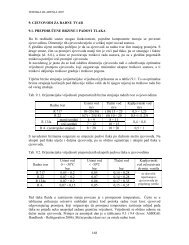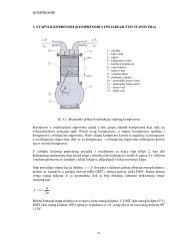universityâenterprise cooperation
universityâenterprise cooperation
universityâenterprise cooperation
Create successful ePaper yourself
Turn your PDF publications into a flip-book with our unique Google optimized e-Paper software.
64<br />
One of the activities in the WBC-VMnet TEMPUS<br />
project (144684-TEMPUS-2008-RS-JPHES)<br />
was the development of methodology and the<br />
implementation of a comprehensive TSNA analysis<br />
(Training & Service Needs Analysis), which was<br />
carried out in all countries of the WBC region,<br />
involved in the Project consortium (Serbia,<br />
Croatia, Bosnia and Herzegovina, Montenegro),<br />
in the second half of 2009. The proposed<br />
methodology included 5 steps, in accordance<br />
with accepted EU TNA methodology. The research<br />
covered a sample of 49 enterprises in Serbia, 31<br />
enterprises in Croatia, 18 in Montenegro and 19<br />
in Bosnia and Herzegovina, from different sectors.<br />
Besides considering the needs of enterprises and<br />
their employees as regards missing trainings and<br />
advanced services in innovative development of<br />
products and processes, the research included<br />
the target group of the unemployed, which<br />
gave insight into labor market needs and the<br />
opportunities of increasing employability of<br />
university staff. For this purpose, standardized<br />
questionnaires for the survey of employers,<br />
employees and the unemployed were developed.<br />
During the research realization, more than 800<br />
questionnaires in the WBC region were collected,<br />
and thus the following has been identified:<br />
1-The needs of enterprises, through:<br />
• Insight into strategic objectives of the<br />
enterprises;<br />
• Analysis of organizational and innovative<br />
potential;<br />
• Assessment of their positioning on domestic<br />
and foreign market;<br />
• Analysis of skills and knowledge of<br />
employees in the development of products<br />
and processes, as well as the<br />
implementation of standards in business;<br />
• Workplace analysis, i.e, the expected<br />
competencies of those who should carry<br />
out activities in that workplace.<br />
2-Existing and required skills of the unemployed.<br />
TSNA results showed that a high percentage<br />
of the surveyed follows trends in their<br />
area, approximately 95%, mainly through<br />
the Internet, participation in trade fairs,<br />
professional literature and <strong>cooperation</strong> with<br />
universities (research teams, centers...).<br />
Managers of enterprises provided the following<br />
reasons as obstacles to innovation, in order of<br />
importance:<br />
1. Lack of funds;<br />
2. Lack of subsidies for innovation;<br />
3. Lack of resources for innovative technologies<br />
(machines, computers, software);<br />
4. Lack of expertise in the enterprise;<br />
5. Unavailability of foreign sources of<br />
knowledge (external services).<br />
Weak information about the trainings available<br />
in the region was detected, because more than<br />
70% of the surveyed answered that they<br />
weren’t familiar with who carried out the<br />
trainings they needed, while only 17% declared<br />
that the trainings offered met their needs.<br />
72% of managers plan their own development<br />
in the application of new technologies<br />
through collaboration with local teams<br />
of experts, and 96% of them would send<br />
their employees to trainings related to new<br />
technologies in the development of products<br />
and processes. About 90% of people surveyed<br />
thought it very important to have professional<br />
literature and software for the development<br />
of new products and services, and were planning<br />
to appear on new markets.<br />
Among the offered list of potential<br />
trainings, which would be developed within<br />
the WBC-VMnet project, and offered by<br />
Collaborative Training Centers in Kragujevac<br />
(Serbia), Rijeka (Croatia), Banja Luka (BIH)<br />
and Podgorica (Montenegro) for employers,<br />
managers and the unemployed, there is the<br />
greatest demand for the following trainings:<br />
1. Specialized trainings related to the type<br />
of business of the firm;<br />
2. Learning foreign languages;<br />
3. Informative seminars about new trends;<br />
4. Introducing new quality certificates,<br />
and related trainings;<br />
5. CAD/CAM technologies;<br />
6. Development and optimization of the production<br />
processes supported by virtual<br />
manufacturing;<br />
7. Project design and management;<br />
8. Business communication and negotiation.
















